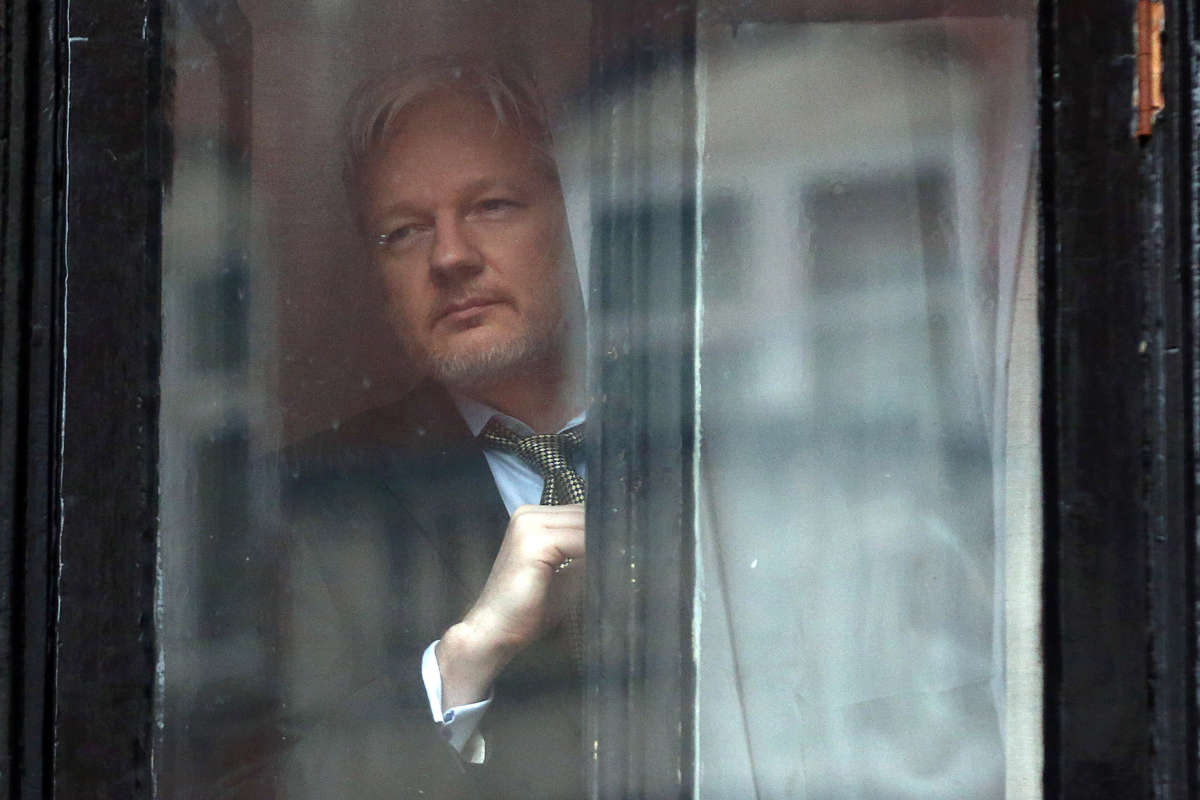Support justice-driven, accurate and transparent news — make a quick donation to Truthout today!
A judge in the United Kingdom has blocked an extradition request from the U.S. to transport Julian Assange, the founder of WikiLeaks, to face espionage charges.
Judge Vanessa Baraitser of the Westminster Magistrates’ Court ruled on Monday that Assange cannot be justly extradited, citing his mental health and the possibility he may attempt suicide.
U.S. authorities are seeking to charge Assange over his role in obtaining and publishing military and diplomatic documents relating to the wars in Iraq and Afghanistan. Assange has been indicted in the U.S. with 17 counts of violating the Espionage Act and conspiring to hack into government computers.
Being found guilty on all 17 charges could land the WikiLeaks founder with a prison sentence up to 175 years.
Assange’s fiancee, Stella Morris, called the ruling a “victory for Julian,” but stressed that their struggles were far from over.
“Let’s not forget: the indictment in the U.S. has not been dropped,” Morris said in a statement following the ruling. “We are extremely concerned that the U.S. government has decided to appeal this decision and continues to want to punish Julian and make him disappear into the deepest darkest hole of the U.S. prison system for the rest of his life.”
VIDEO: 🇬🇧 Julian #Assange's fiancee Stella Moris says 'today is a victory for Julian' after a British judge ruled the WikiLeaks founder should not be extradited to the US, but adds she is 'extremely concerned that the US government has decided to appeal this decision' pic.twitter.com/jJ5JMEKE3H
— AFP News Agency (@AFP) January 4, 2021
Human rights groups hailed the ruling as a victory after it was announced, but the justification made by Baraitser was not the rationale they were seeking to have stop Assange’s extradition. Instead, they had hoped the judge would have agreed with their argument that the charges against Assange violated his free press rights and were politically motivated.
Baraitser appeared to reject those arguments, stating that American authorities seeking his extradition had brought the case “in good faith.” She also suggested that free speech rights don’t give “unfettered discretion by Mr. Assange to decide what he’s going to publish.”
Baraitser did rule, however, that “Mr. Assange’s risk of committing suicide, if an extradition order were to be made, [would] be substantial.”
The extradition policy that exists between the U.K. and the U.S. prohibits extradition for a “political offense.” According to Marjorie Cohn, professor emerita at Thomas Jefferson School of Law and the deputy secretary general of the International Association of Democratic Lawyers, extraditing Assange to the custody of U.S. officials would be a direct violation of that agreement.
“Assange was indicted for exposing U.S. war crimes in Iraq and Afghanistan. That is a classic political offense,” Cohn said, writing for Truthout in February last year. “Moreover, Assange’s extradition would violate the legal prohibition against sending a person to a country where he is in danger of being tortured.”
Baraitser’s ruling also appeared to include a subtle indictment of the U.S. prison system. The judge wrote that “it would be unjust and oppressive by reason of Mr. Assange’s mental condition” for him to be sent away, citing the “harsh conditions” of where he would most likely be detained in the U.S. as being detrimental to his mental well-being.
Prosecutors representing the U.S. have said they plan to appeal the ruling.
The material for which Assange was indicted, published by WikiLeaks in 2010 and 2011, was supplied by former Army intelligence analyst Chelsea Manning, who was sentenced to 35 years in prison for her role in exposing the Army’s criminal actions in Iraq and Afghanistan. Manning later had her sentence commuted to the seven years she had already served by former President Barack Obama.
WikiLeaks published hundreds of thousands of documents related to the wars in those two countries. Among the most notorious of those publications was the 2007 “Collateral Murder” video, showing an Army helicopter and members of the U.S. military targeting and firing upon unarmed citizens in Baghdad, including two Reuters journalists. Eighteen individuals were killed in that incident, and according to Cohn, at least three separate war crimes prohibited by the Geneva Conventions and the U.S. Army Field Manual were also visible within the video.
Holding Trump accountable for his illegal war on Iran
The devastating American and Israeli attacks have killed hundreds of Iranians, and the death toll continues to rise.
As independent media, what we do next matters a lot. It’s up to us to report the truth, demand accountability, and reckon with the consequences of U.S. militarism at this cataclysmic historical moment.
Trump may be an authoritarian, but he is not entirely invulnerable, nor are the elected officials who have given him pass after pass. We cannot let him believe for a second longer that he can get away with something this wildly illegal or recklessly dangerous without accountability.
We ask for your support as we carry out our media resistance to unchecked militarism. Please make a tax-deductible one-time or monthly donation to Truthout.
